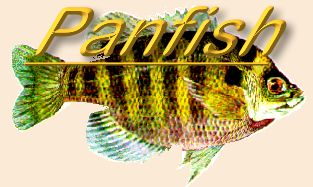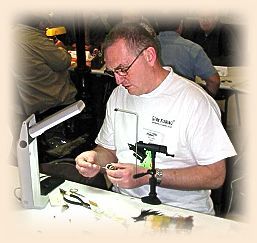|
Things have slowed down drastically for my lunch hour
fishing excursions. There has been just enough rain
around the lake to wash all of the dust that had
accumulated on the vegetation into the lake. The water
is off color. The wind has been blowing at least 15 mph
most of the time for the past two weeks. The water has
just not had a chance to clear.
That means that it takes a little more effort to connect
with the fish, especially when you cannot move around a
lot. But, it is a time that I can get out to the water.
I try not to miss those opportunities. I have been known
a time or two to make those opportunities.
It is a good time to work on my left-handed casting, which
is getting better all of the time. I picked up on doing this
from a JC article a few years ago. I hope that he is proud
of the fact that someone listened to him. Even in the canoe
it has been convenient to cast left-handed at times. Even if
the fish do not bite, I take it as time well spent. I have
added about 10 feet to the casts that I can make with either
hand, and my left-handed casts are about 75% as accurate, in
placement, as my right-handed casts are now. There might even
be some hope for me.
Because the water has been colored. I decided to tie a couple
of a flies with different materials to see how they might work.
I did a Skip Morris Panfish fly, but used silver mylar for the
body, and then used some red flash material over some yellow
flash material. Between the two layers of flash I did put in
a few strands of silver Krystal Flash. I wanted a fly that
was bright and would reflect light to be more visible in
the water.
I had one of these flies on and could see it when it was about
two feet deep in the water. If I could see it that far in the
water, then it should be visible to fish over a greater
distance. Fish see better in the water than we do by quite
a bit.
I was at the settling pond, by the lake, again. With the color
of the water I thought a few fish might be swimming along the
edge of the break-line that parallels the road. When I am at
the end of the culvert that runs under the road that means
that it is about five feet farther out than I am.
If I cast out so the fly is along the break-line and then
point my rod perpendicular to the line I can keep the fly
along the break-line better. If I keep the rod and line in
a straight line then my retrieve distance is much shorter.
I get into the weeds, over the shallow water on the shore
side of the break-line, much faster.
I am happy to report that the fly did work for me. I would
get three or four fish a day doing this. I got a few small
bass, some bluegills and a few crappie. It was fun to catch
them, especially when the folks on the main lake were not
doing as well.
I was out on a Thursday when it happened. I had a few fish
hit, but it was not very hard and I seemed to be too fast
on the strike. I decided that on the next fish I would wait
after the fish first hit to see if they needed more time to
get the hook in their mouth. It might even work better for
me. You just don't know until you give it a try.
I had made several casts, when I felt a tap on the fly. I
let it just set there for a few seconds and nothing happened.
I moved the fly about two inches with a fairly quick strip.
I wanted it to look like the fly was trying to get away.
That seemed to be the ticket as the fly was hit hard. I set
the hook and knew immediately that this was a big fish. When
you set the hook and the rod tip goes down there is some
weight on the other end.
This fish did not like the idea of being hooked and headed
for the far side of the pond in a hurry.
I did not even try to stop the fish. I let the line go out
and hoped that the fish would tire some time and that was
the time to try to retrieve line. I did have the rod held
up above my head. It was my attempt to keep the fish up in
the water column, away from the debris on the bottom.
When the backing started going off the reel, I started to
get excited. I had not had many fish do this, and the ones
that had were good sized. I really wanted to see this fish
and maybe get my hands on it. I did not want to keep it,
but I wanted to be able to say that I landed it.
I had about ten yards of backing out when the fish began
to slow down. I put a little pressure on the reel and the
fish turned. Now it became a tug-of-war. I brought the rod
down to make it easier for me to fight the fish. I would
pull in a little line as the fish swam back and forth, far
out in the pond. I would gain some and then I would lose
some. But the longer it went the more I knew that the fish
was getting tired. The sucker on this end of the rod
was beginning to feel it a little also.
After about ten minutes I got all of the backing back onto
the reel. This was a 30-yard line, so the fight was not over.
But I was gaining more than I was losing in each exchange
with the fish. I also was beginning to think of how I would
land this fish if I got it near the shore. The five feet
of water before the break-line is very shallow and I was
not sure that this fish would come over that very well.
But I had a lot of line to come in before that became a
problem.
It was still a slow process to gain line, but it was
happening. I continued to keep pressure on the fish. I did
not want the fish to have a chance to rest and gain any
strength. I knew that a few vehicles had been going by
on the road, but I had been concentrating on the fish.
then heard a voice behind me say, "I hate you, but I have
my landing net if you ever get this fish to the shore."
It was one of the guys who fishes the main lake, with a bass
boat, fairly often. We have seen each other several times.
It bugs him that someone with a wimpy rod can stand on the
shore and catch fish, while he is out in his boat with all
the fancy gear and gets nothing. I tell him that it due to
tremendous skill with the long rod. He is more inclined to
pure dumb luck, which might be closer to the truth.
After about twenty-five minutes I had much more control
over the fish. I was gaining much more line than I was
losing. I could tell that the fish was tired. I got her
close enough to see her and was surprised to see how big
this bass was. This might be the biggest one that I had
ever caught.
I got her close and then swung her around so she was coming
along the break-line. I led her right into the net. She let
me get the fly out of her mouth and then held her up to
weight her. It was my best bass, 8 lbs., 4 oz. I wanted
to make sure that this fish would live and she was very
carefully put back into the pond. As soon as she
was struggling against the net, I released her.
Two other cars had stopped and folks were saying that
they were going to come back to catch her and have her
mounted.
I decided that the best place for her to go was into the
main lake and make it harder for them to find her. The
settling pond would make it too easy. I carried her over
the road in the net and turned her loose in the main lake.
She had rested enough that she disappeared in a hurry.
It was a fun lunch hour, but I was out of time. I thanked
Bill for the use of his net and for stopping to help me.
I then had to head back for work.
Hope you can get out on the water. ~
Rick
|



